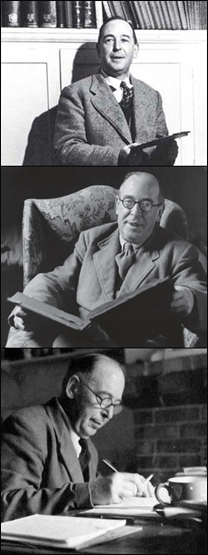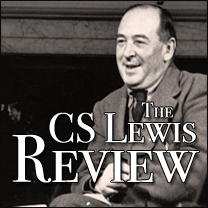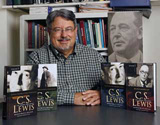
An Introduction to The Personal Heresy
June 21st, 2008 | Skip to comments
To be published in August, 2008, as introduction to The Personal Heresy, reprinted by Concordia University Press, ed, Dr. Joel Heck.
Dr. Bruce L. Edwards
Professor of English and Africana Studies
Bowling Green State University (Ohio)
In The Personal Heresy, we find C. S. Lewis “at work,” so to speak, performing his professional duties as scholar and tutor with aplomb; this is the same Lewis who delights his readers in every other genre in which he invested. The same clarity, grace, accessibility, erudition, and rhetorical precision and forcefulness are in evidence here just as they are elsewhere. Lewis is ever perspicacious in insight, audacious in performance, generous yet unyielding to flawed or limited viewpoints.
The return of The Personal Heresy to print is thus a welcome event, indeed, and to be celebrated by all who wish to reflect more upon Lewis’s maturation as a literary polemicist and prose stylist. (I hasten to say that there may be equally grand reasons for devotees of E. M. W. Tillyard, his respondent in this exchange, to rejoice, but I suspect those may coincide little with those bringing readers of Lewis to this volume for the first time.)
C. S. Lewis’s phenomenal, prolific career as a literary historian is the least known and least appreciated among his many devoted readers. (I use the term “literary historian” advisedly because Lewis found the term “literary critic” and the Times Literary Supplement universe of “criticism” fraught with all sorts of elitist, taste-mongering, pseudoscientific baggage—sentiments that he is, at least indirectly, trying to address and defame in this exchange with Tillyard.) Granted, the topics undertaken here form unfamiliar ground to the vast majority of those who have come to Lewis for his Christian apologetics, poetry, or fantasy—but those who willingly stay to inhabit and try to fathom the argumentation that unfolds under Lewis’s lucid control will be doubly rewarded.
First, they will get to experience firsthand what it might have been like to have been across the room from the formidable Mr. Lewis in a tutorial session, as he interrogated definitions, challenged command of text and context, and probed the “real life” implications of what one has said. E. M. W. Tillyard was, of course, the “senior scholar” in this disputio, and is hardly sitting down as one of Lewis’s undergraduate tutees; but, reading carefully, one will see that this is exactly the position into which he is put. Lewis is unrelenting, yet also gracious on points where disagreement must simply be agreed to.
Secondly, they will come to understand better the remarkable integration of Lewis’s life and thought, how consistently and thoroughly his deepest convictions about what’s good, true, and beautiful, which is to say, eternal, are expressed by that ever fertile and fearless mind of his, even in the rarefied air of scholarly debate. I suggest this knowing that much of the substance of Lewis’s argument here was taking shape well before his own acknowledged conversion to Christ; and yet his thrusts and parries here are completely congenial, perhaps even foundational, to it.
For Lewis is always on the alert for any smuggled-in propositions that nefariously deny humanity its humanness, artists and audiences their common ground of rationality and imagination, and poems their ability to speak out of their own times on their own terms. All deserve, in Lewis’s mind, to be free of psycho-therapeutic impositions from other eras. The tenets of Christianity are true or false, and whether aesthetically or psychologically pleasing, these tenets concerned a writer like John Milton for the same reasons in his day that should concern us in our own. Or so the implications of Lewis’s attack on “the personal heresy” would demand that we conclude, even if they are not front and center here—as they are not. But Lewis would pick up that particular theme more explicitly in defending Milton’s defense of the “ways of God to man” in his later work, A Preface to Paradise Lost (1942).
Though there are some dense thickets here and there in The Personal Heresy to be sure—places where Lewis and the reader must travel because the “opposition” accidentally strands us there—Lewis is a wise navigator who handles a compass well, and if we have sufficient patience, he will lead us out into sunnier paths and climes. Lewis believed, and certainly champions here, that primary experience is the goal of all cognition and perception, not least in the act of reading. It is the “quiddity” of life that we wish to embrace; encountering life as it is or as presented to us in works of art is what we mean by “meaning”: its wonders and commonplaces, its beauty, its ugliness, its laughter, its tears, and so on. We would see with others’ eyes, Lewis demands, the poet not as a spectacle but as our spectacles.
Defining Terms
In facing a work of art, it is the critical theorist who stands between us and that primary experience Lewis would enjoin. Each moment we spend thinking about the theory behind the poem is less time spent with what the poet asks us to see and hear. The role of the critical theorist, then, if there is one at all, is to clear debris from our line of sight, to help us solve linguistic puzzles borne of mere ignorance (rather than principled blinders), and thus to provide, maximally, what Lewis called “an unobtrusive map” to guide our incarnation into the text or objet d’art and to set us free to know and to mean.
That mapmaking is what Lewis attempts in The Personal Heresy on a more theoretical plane than he is usually comfortable with. Yet he is forced, by the terms of the debate, to found a theory of poetry (or poetics) on the fly in response to Tillyard’s tactical moves. He is, I believe, terrifically good at it, as good at conveying the abstract as he is the concrete, but we should be grateful that he saw his vocational and spiritual calling to emphasize the latter.
“The Personal Heresy” refers both to (1) a subtle but debilitating concept C. S. Lewis identified early in his professional career as inimical to effective criticism and authentic engagement of poetry and art; as well as, (2) the title of this now reprinted 1939 publication that collects the dynamic exchange between Lewis and then renowned Milton scholar, Tillyard, on the topic of what poetry is “about.” This debate consists of three essays each from the two controversialists, and a final note from Lewis that in effect gives him the last word. As such, it stands as a nimble and useful compendium of Lewis’s earliest formulation of what he thinks constitutes the act of composing—and the critical and readerly response appropriate to poem and poet. (Here “poem” and “poet” refer not just to the genre of “poetry” as they are normally understood, but rather to any imaginative work and any “maker” of art, irrespective of genre.)
Put directly, “the personal heresy” is Lewis’s ingenious label for a critical stance he found “heretical” to good literary practice, namely, the unwise notion that poetry is first and foremost the “expression of the poet’s personality.” What follows from such a premise, Lewis avers, is that a reader of a poem becomes oblivious to “seeing what the poet sees” in favor of unearthing and assembling fragments of the poet ‘s psyche. I read to know the poet, not the poem. What follows from this heresy, Lewis postulates, is that the brand of criticism most likely to be fruitful in illuminating the poem will be prohibitively biographical or psychoanalytical. And for Lewis this is anathema. Speculating on “What the poet is really saying” becomes superior to what he or she has actually said. The lines of the poem itself would be invariably lost to what’s read between them.
Origins of the “Personal Heresy”
Lewis’s formulation of the “personal heresy” seems to have had a long gestation, the idea first surfacing in a presentation he made in the summer of 1924 to the Martlets, an undergraduate Oxford literary society, on the topic of James Stephens, a popular Irish writer of the time. We learn from a brief summary of his talk that Lewis’s essential point was that Stephens’ personal biography had little to do with understanding or appreciating the meaning of his works—and, in fact, could actually diminish it.
In 1930, Lewis addressed the Martlets once again, but this time as a don, having more fully conceptualized the malady he believed plagued contemporary criticism and could undermine students’ confidence in being able to experience poems as both “logos” (something said) and “poiema” (something made), distinctions only implied here, but explained more fully in his later, “last” work of literary criticism, An Experiment in Criticism (Cambridge: Cambridge UP, 1961).
The title for this more elaborate address revealed that Lewis had found a distinctive name for this malady: “The Personal Heresy in Poetics. ” In preparing his audience for his diagnosis, Lewis begins with a critique of an advertisement for a war-time poetry anthology that purportedly would inform readers of very private feelings associated with tramautic events that “not even soldiers’ loved ones could discern.” The reader must infer that the motive for buying and the reading the anthology is not to experience what it might have been like to have been in a battalion at war, but rather to discover the secrets some soldier-poet might unwittingly “reveal” of his psychological state. Such poems were to be treated as data: suppressed psychological wounds, emotions, notions that could, by the crafty reader, be discerned and articulated quite apart from the “actual content” of the poems themselves. In other words, the original authors of these poems might be “saying something” to their readers that they themselves might be unaware of, perhaps even be opposed to, but certainly would not intend to say.
Characteristically, Lewis treated this facile equation of the poet’s presumed “mental state” with the now exiled subject matter of the poem as more than just bad critical practice; it epitomized to him the “poison of subjectivism” that had been creeping into education, and, now, perhaps, had made it to the public square. His attack on this dubious notion will remind many readers of his critique in The Abolition of Man (1943) of “The Green Book,” a collegiate composition textbook he believed undermined “objective value” and taught students and teachers alike to reduce all comprehension and knowledge to the bundle of feelings that their reading material evoked in them. To accept this premise, Lewis believed, is to destroy the very purpose of reading poetry, or understanding anything else.
The Lewis-Tillyard Exchange
By the 1930s, Lewis found this “heresy” now de rigueur, and securely embedded in E. M. W. Tillyard’s influential 1930 work, Milton. Proclaimed by an established scholar and thus possessing that much more prestige than a mere jingoistic advertisement, the personal heresy was more likely to become entrenched in the critical consciousness in and out of schooling. Its menace for Lewis is summed up what he called the “concealed premise” of Tillyard’s volume: “all poetry is about the poet’s state of mind.” Tillyard blithely foregrounds propositions that confounded Lewis: (1) that to understand Paradise Lost aright one must read it as an “expression of Milton’s personality,” and that, therefore, (2) “the end we are supposed to pursue in reading . . . is a certain contact with the poet’s soul.”
Lewis undertook to rebut to such views first, in a single article published in 1934, then in the series of exchanges between him and Tillyard that ensued in the journal, Essays and Criticism. These, and Lewis’s epilogue, are herein collected as The Personal Heresy. Lewis argues that to be successful the poet must create an object that is universal not local, public not private, impersonal not personal, since therein the poet allows the reader of any era or disposition the opportunity to see what the poet sees–-and not primarily nor especially glimpses of the poet “himself”:
The poet is not a man who asks me to look at him; he is a man who says ‘look at that’ and points; the more I follow the pointing of his finger the less I can possibly see of him (17).
Consequently, for Lewis, the critic’s role is never to deconstruct the poem as concealed biography; rather, it is to help the reader see with ever greater clarity the world depicted in and through the poem that the poet has intentionally composed. As Lewis observes later in the exchange, “there is no essential qualification for criticism more definite than general wisdom and health of mind” (111), since poetry, whatever its mix of symbols and images, rhyme and metre, is about “real things,” or even “imagined things,” whose reception merely require us to be human, not experts in reception theory.
Tillyard’s response to Lewis consists primarily in defending his conception of criticism and the “poet’s personality” against the caricature he believed Lewis had created; he contends, for instance, that Lewis unfairly reduces his notion of the “poet’s state of mind” merely to the trivial details of a poet’s life. Rather, Tillyard clarifies, in speaking of the poet’s mental state, he is including the whole social and historical context out which a poet speaks and how he reflects his own era, and that this is, indeed, the proper province of modern criticism.
While Tillyard attempts to find common ground with Lewis where he can, he dismisses, finally, what he considers Lewis’s near total rejection of all aspects of psycho-biographical modes of criticism. By the end of the exchange, Lewis has expressed gratitude for the chance to sharpen his own points of view, to come to understand better Tillyard’s own positions, but he really concedes only some relatively minor points of disagreement on terminology.
Reflections on The Personal Heresy
Lewis’s response to Tillyard in The Personal Heresy is of a piece with much of his literary discourse in the 1930s and 1940s, exemplifying what would become Lewis’s consistent themes in all of his post-conversion nonfiction work, championing as it does the cogency of the doctrine of objective value, opposing the relativistic mindset ascendant in modernist Western culture, and directing his readers attention back to the concreteness of a real world that cannot be wished away.
Lewis here and elsewhere associated the biographical and psychological criticism of his times with a resurgent Gnosticism that denied the reality to which a poem pointed, and mistakenly and triumphantly affirmed in its place the substitute world of the critic’s ultimately vain, perhaps solipsistic, reconstructions. Perhaps Lewis’s strongest yet most winsome contention in The Personal Heresy can be found succinctly stated near the end of his third essay; theory and bombast aside, he says:
The only two questions to ask about a poem, in the long run, are, firstly, whether it is interesting, enjoyable, attractive, and secondly, whether this enjoyment ears wells and helps or hinders you toward all the other things you would like to enjoy, or do, or be (113).
Even when the “personal heresy” is not promoted as a dogma at the point of a critical sword, Lewis believed it inevitably nurtures a brand of reading that calls for elites and initiates or, worse, encourages readers themselves to aspire to such egoistic noblesse. Lewis’s lifelong ruminations on these trends and dilemmas find their culmination in his richly rewarding yet challenging work, An Experiment in Criticism—a kind of theology of reading that should be read alongside The Personal Heresy, and Lewis’s retelling of the Cupid-Psyche myth, Till We Have Faces (1957) as—one might muse—they are really “about” the same thing: transcendence.
Lest we be robbed of the simple, profound pleasures to be found in being creatures in a richly diverse, created universe, Lewis gently reminds that
Literary experience heals the wound, without undermining the privilege, of individuality. There are mass emotions which heal the wound; but they destroy the privilege. In them our separate selves are pooled and we sink back into sub-individuality, But in reading great literature I become a thousand me and yet remain myself. Like the night sky in the Greek poem, I see with a myriad eyes, but it is still I who see. Here, as in worship, in love, in moral action, and in knowing, I transcend myself; and am never more myself than when I do (140-41).




A good start! Would like to know about this journal and how to contribute.
Comment by Hector Ramos — 25 April 2008 @ 11:43 AM
[…] Heresy as an idea is a little bit slippery. I would encourage the reader to find Bruce Edwards’ introduction—also available here—to the reprinting of The Personal Heresy (2008; edited by Joel Heck). […]
Pingback by The Personal Heresy and the Growth of a Person | A Pilgrim in Narnia — 29 July 2013 @ 6:39 AM